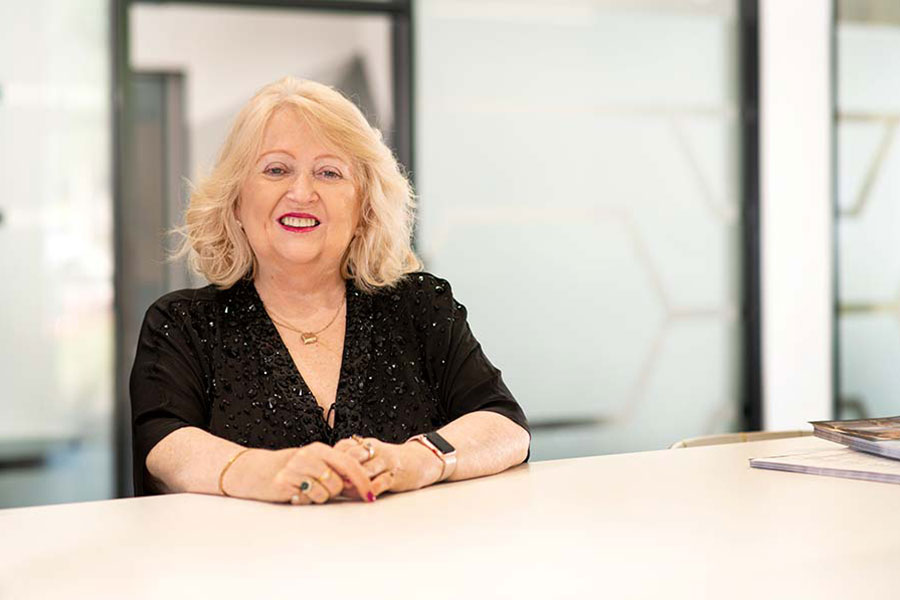Researcher Highlights
Changing the professional identity linked to the way teachers think
Dr Deborah Trevallion is building the teachers’ of tomorrow’s skills in problem solving teaching methods that promote higher order thinking skills, innovation and creativity in their lives and their classrooms.

Dr Deborah Trevallion is equipping University of Newcastle technology education students with the practices needed to help secondary school students cope with the rapid changes occurring in the world today. Her research focuses on finding new ways to shape teacher’s professional identities that support curriculum and other changes that are frequently thrust upon them in an ever-changing world.
Deborah’s work ensures the education students leave university using the higher order thinking skills needed to mold the minds of school students into problem solvers.
Deborah works in Technology Education which encompasses computing, graphics and multimedia technologies, food technologies, textiles technologies, engineering technologies, STEM and industrial technologies. The challenge she faces is changing university teaching students’ mindsets from one focused on lock-step manufacturing to one of innovation, sustainability and problem solving using emerging technologies.
“My job is to change the professional identity of students, alter their thinking and to show them that the curriculum is so much richer when you can include in a lesson not only the skills need to make something but also the design, technology, maths, engineering and science behind it.”
For her thesis Deborah designed a model to evolve Technology Education students thinking from a manufacturing perspective to a design based, problem solving perspective. The model involves education students firstly observing a variety of styles of teaching, reflecting, evaluating and e-Journaling their observations before discussing them openly in the classroom. They then participate in authentic problem solving activities in actual communities of practice. The university students then use what they learned to micro teach the Technology Mandatory syllabus in schools.
“I ask them to compare what they saw and inevitably they notice that the students in the skills based lesson are bored and disengaged and are quite the opposite in the problem solving lesson,” Deborah said.
“A problem solving approach allows the students to think through the difficulty themselves and research how to solve it, before manufacturing and evaluating the solution, rather than being drip fed information by the teacher. It’s an entirely more engaging and effective way to teach in this area.”
Looking at how to incorporate this model of teaching into other curriculum areas experiencing change is the focus of Deborah’s current research. She is also researching alternative methods of assessment in STEM subjects.
“STEM is difficult to assess as it’s about collaborative and autonomous learning in rich settings. It is about increasing student motivation, moving their thinking forward and solving problems in innovative ways that use a combination of science, technology, engineering and mathematics. How do you assess whether students have achieved all of this?” Deborah asked.
Deborah is on the board of the International Journal of Innovation Creativity and Change and has written a chapter on changing the professional identity of food technology teachers in the book Global Perspectives on Food Technology Education published by Springer. Her Excel study guides in Design and Technology were best sellers.
Impacting students lives
Deborah coordinates a number of undergraduate and postgraduate courses and programs at the University of Newcastle, which means her work has a flow on effect that impacts students and families around Australia.
“My success lies in the university students that go out and teach in schools, as they will help grow the minds of Australia’s children,” she said.
“Change is constant and we have to teach children how to be able to cope with that. I think the reason why we have so many mental health problems is because so much change is forced upon children at a rapid rate. But if we can teach them to cope with change and give them a problem solving approach to everything they will be better equipped to handle life. I believe what we are doing is essential.”
Deborah was the recipient of the highly prestigious Amy and King O’Malley scholarship in 2016 – 2018. One of the main criteria of the award was the ability to impact Australian society for the better.
“My passion lies in helping people become the best that they can be,’ Deborah said.
What motivates Deborah is hearing how her students put their learning to work in their own classrooms and lives. One of her students recently put their problem solving skills to use in an example that shows how innovative thinking can solve real world problems.
“One of my technology education students visited her family in the Torres Strait Islands and found that the traditional fishing village was finding it harder and harder to catch fish as stocks dwindled,” she said. “My student devised a way to catch fish further from the usual fishing zones using a drone with a net attached to it. This is a classic example of problem solving with technology.”
Deborah’s vision for the future is that she would like to see students finish school as life long learners with a passion for learning and solving problems by working through a process they have been taught. However her fear is that teaching Technology Education is being slowly devalued .
“Skill based classes, which are a necessary part of problem solving, are becoming too expensive for schools and universities to run. My fear is that the direction we are going, will see students design things on paper using CAD rather than creating the material based solutions with their hands.”
The University of Newcastle acknowledges the traditional custodians of the lands within our footprint areas: Awabakal, Darkinjung, Biripai, Worimi, Wonnarua, and Eora Nations. We also pay respect to the wisdom of our Elders past and present.
